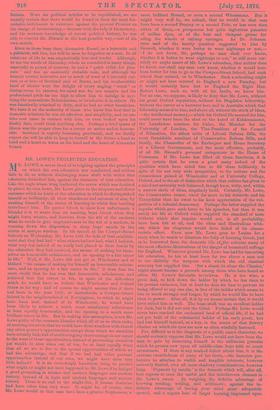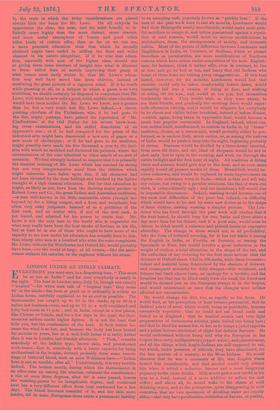MR. LOWE'S NEGLECTED EDUCATION.
MR. LOWE is never tired of inveighing against the principles on which his own education was conducted, and seldom fails to do so without discharging some shaft with which that education furnished him, against the character of that education. Like the eagle whose wing feathered the arrow which was destined to pierce its own heart, Mr. Lowe gives to the eloquent and clever sarcasms which he hurls at the education in which he distinguished himself so brilliantly, all their steadiness and sureness of aim, by availing himself of the stores of learning to which that teaching introduced him. He quotes Greek to show how unfortunate a blunder it is to waste time on teaching boys Greek when they might learn science, and borrows from the wit of the ancients what he needs to give impressiveness to the wit of a modern, in running down the disposition to steep boys' minds in the stores of antique wisdom. In his speech at the Cowper-Street Schools on Wednesday, Mr. Lowe told the lads of that establish- ment that they had had " what others had not had, what I had not, what very few indeed of us really had placed in their hands by the education they bad received, the means of making for them- selves an honourable subsistence, and an opening to a fair career in life." Well, if Mr. Lowe did not get at Winchester and at Qxford " the means of making for himself an honourable subsist- ence, and an opening to a fair career in life," it does him the more credit that he has won that honourable subsistence, and achieved that fair career in life, in spite of the difficulties which he would have us believe that Winchester and Oxford threw in his way ; and of course we might assume that if there had been in the year 1821, or thereabouts, a Cowper-Street School in the neighbourhood of Nottingham, to which he might have been sent, instead of to Winchester, he would have been likely to achieve a much more satisfactory subsistence at least equally honourable, and the opening to a much more brilliant career in life. But in making this assumption, is not Mr. Lowe guilty of the common blunder which all of us so often make, of assuring ourselves that we could have done wonders with almost any other person's opportunities except those which we ourselves have actually had, and of attributing any shortcomings in our career to the want of those opportunities, instead of persuading ourselves (as would, in nine cases out of ten, be at least equally true) that all we are is due to the special opportunities of which we had the advantage, and that if we had had other persons' opportunities instead of our own, we might have done very little indeed? It is an exceedingly hazardous thing to predict what might or might not have happened to Mr. Lowe if lie had got a good grounding in science and modern languages and modern history, instead of in logic and ancient languages and ancient history. There is no end to the might-bes, if human destinies bad been other than they were. It might be, of course, that Mr. Lowe would in that case have been a greater Stephenson, a
more brilliant Brunel, or even a second Wheatstone. But it might very well be, we submit, that he would in that case have been a second Brassey or a second Peto, or less even than either of them,—a prosperous but quite inglorious Patentee of aniline dyes, or of the best and cheapest grease for oiling the wheels of railway carriages. As Dr. Johnson onee said of the knotty question suggested to him by Boswell, whether it were better to wear nightcaps or not,- ' I do not know, Sir, perhaps no man shall ever know, whether it is better to wear nightcaps or not," so still more cm.= tainly we might assert of Mr. Lowe's education, that neither does he know, nor shall any man ever know, whether it would have been better for him to go to the Cowper-Street School, bad such school then existed, or to Winchester. Such a schooling might or might not have secured to England a new Faraday, but it would certainly have lost to England the Right Hon. Robert Lowe, such as, with all his faults, we know him. For no one, we suppose, is likely to deny that Mr. Lowe, without his great Oxford reputation, without his Magdalen fellowship, without the career as a barrister here and in Australia which that fellowship secured to him, and above all, without the stock of ideas, —the intellectual scenery,—which his Oxford life secured for him, could never have been the elect or the hated of Kidderminster, the Lansdowne nominee for Caine, the Member for the University of London, the Vice-President of the Council of Education, the ablest critic of Liberal Reform Bills, the most formidable assailant of Conservative Reform Bills, and finally, the Chancellor of the Exchequer and Home Secretary of a Liberal Government, and the most effective, probably, of all Mr. Disraeli's personal antagonists in the House of Commons. If Mr. Lowe has filled all these functions, it is quite certain that he owes a great many indeed of the qualities which have aided him to fill them brilliantly, in spite of his not very wide sympathies, to the culture and the connections gained at Winchester and at University College, Oxford, and to the air of distinction which that culture has given to a mind not naturally well-balanced, though keen, witty, and, within a narrow circle of ideas, singularly lucid. Certainly, Mr. Lowe, the Conservative orator, owed far more to his Aristotle and his Thucydides than he owed to his keen appreciation of the vul- garities of a colonial democracy. Perhaps the latter supplied the impulse which gave such force to his speeches, but then it was surely his life at Oxford which supplied the standard of taste without which that impulse would not, in all probability, have been felt at all, and the ideas and illustrations with- out which his eloquence would have failed of its charac- teristic effect. Even now Mr. Lowe goes to Lucian for a story when he wants to illustrate the folly of learning Greek, just as he borrowed from the domestic life octhe colonies many of the most effective illustrations of the danger of household suffrage for England. Whatever ground Mr. Lowe has had for lamenting his education, he has at least been far too clever a man not to use skilfully the weapons with which the old classical armoury has supplied him. 'Set a classic to abuse the Classics,' might almost become a proverb among those who have heard so often Mr. Lowe's favourite invectives. He is too wise, a great deal, to kick down the ladder by which he has risen to his present eminence, but at least he does his best to prevent its being offered to any one else, in lieu of the ladder which seems to him so much stronger and longer, by which he would like to have risen to power. After all, it is by no means certain that it would have suited him as well. The bean-stalk was an excellent ladder for Jack, but it did not suit the Giant. Perhaps Mr. Lowe would never have reached the enchanted land of official life, if he had not got hold of the substantial ladder of his early youth, but had lost himself instead, as a boy, in the mazes of that flowery climber on which his eyes are now so often wistfully fastened.
For, difficult as is the diagnosis of a public man's character, we should certainly suppose that Mr. Lowe would not have been the man to gain by immersing himself in the utilitarian pursuits which he presses now upon all middle-class boys with so much earnestness. If there is any marked defect about him, it is the extreme onesidedness of many of his views,—the immense pre- ference he attaches to visible and tangible interests, however narrowly limited, over all more shadowy considerations, however large. 'Payment by results' is the formula which will, after all, best express at once the useful and the mischievous element in Mr. Lowe's career. In weighing the definite advantage of knowing reading, writing, and arithmetic, against the in- definite advantage of having your mind more adequately opened, and a vaguer love of larger learning impressed upon
it, the scale in which the latter considerations are placed always kick the beam for Mr. Lowe. On all subjects he appreciates the clear, the near, and the solid benefit, so in- finitely more highly than the more distant, more obscure, and more aerial atmosphere of beauty and good which other kinds of culture offer, that, as far as we can see, a more practical education than that which he actually obtained might have ended in stifling the finer and wider element in his nature altogether. If it be true that educa- tion, especially with men of the higher class, should aim at giving them some tincture of insight into what is dimmest to them, rather than at merely improving their grasp of what comes most easily within it, then Mr. Lowe's educa- tion may well have saved him from oblivion, instead of mutilating the great powers of a vigorous mind. If it be worth while guessing at all, on a subject in which a guess is so very worthless, we should certainly be disposed to conjecture that Mr. Lowe, with what he now calls a good, solid, middle-class education, would have been neither the Mr. Lowe we know, nor a greater than he, but a very much less Mr. Lowe indeed,—a clever, pushing chieftain of the Philistines, who, if he had gone to the Bar, might, perhaps, have gained the reputation of ' Mr. Chaffenbrass ' at the Old Bailey for his severe brow-beat- ing cross - eraminations, and his skilful demolition of an opponent's case ; or if he had competed for the prizes of the industrial arta, might have discovered a new sort of paper or a new mode of electrotype ; or if he had gone in for medicine, might possibly have made his five thousand a year by the deci- f31011 with which he snubbed and doctored his patients, where the circumstances of the case admitted to other minds of no sort of certainty. We feel strongly inclined to suspect that it is primarily the classical training of Mr. Lowe which has rescued his strong but not very comprehensive mind from the oblivion which might otherwise have fallen upon him, if his character had not been elevated by the finer feelings and touched by the lighter thought of a high classical education. But for that education he might, as likely as not, have been the thriving senior partner in Robert Lowe and Co., the great Indian and Australian outfitters, —a man well-known in his little mercantile circle (though not beyond it) for a biting tongue, and a keen and trenchant, but often very risky judgment, instead of as a politician of the first rank, and an orator who, if not of the first rank, is yet feared, and admired for his power to excite fear. Mr. Lowe is not the only man in the world who is ungrateful for what may really have been the best stroke of fortune in his life, but at least he is one of those who ought to have more of the sagacity to see how useful his education has actually been to him, than ninety-nine men in a hundred who utter the same complaints. Mr. Lowe, without his Winchester and Oxford life, would probably have been,—to the world at large, at all events,—like the astro- nomer without his calculus, or the engineer without his steam.































 Previous page
Previous page